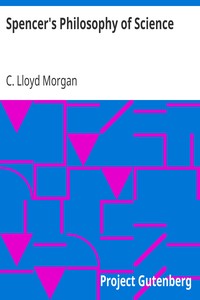Spencer's Philosophy of Science by C. Lloyd Morgan
"Spencer's Philosophy of Science" by C. Lloyd Morgan is a scientific publication that was delivered as a lecture in the early 20th century, specifically in 1913. The book explores the philosophical contributions of Herbert Spencer to the understanding of science and evolution, emphasizing his theories on the unity of knowledge and the principles that govern progress and differentiation in nature. In this work, Morgan examines and critiques Spencer's ideas, particularly his concept
of evolution as a universal principle that applies across various fields including biology, psychology, and sociology. He articulates how Spencer viewed the transformation of homogeneous entities into complex forms as a cardinal law of evolution, supported by the assertion that changes yield multiple effects. However, Morgan also identifies limitations in Spencer's framework, especially concerning the treatment of consciousness and cognition as integral components of evolution. He argues for a more comprehensive, scientific interpretation of these higher forms of relatedness, suggesting that without recognizing the distinct types of relationships that arise in complex systems, such as cognition and life itself, a complete understanding of science and its philosophy cannot be achieved. (This is an automatically generated summary.)
Read or download for free
| How to read | Url | Size | |||
|---|---|---|---|---|---|
| Read now! | https://www.gutenberg.org/ebooks/37513.html.images | 143 kB | |||
| EPUB3 (E-readers incl. Send-to-Kindle) | https://www.gutenberg.org/ebooks/37513.epub3.images | 121 kB | |||
| EPUB (older E-readers) | https://www.gutenberg.org/ebooks/37513.epub.images | 123 kB | |||
| EPUB (no images, older E-readers) | https://www.gutenberg.org/ebooks/37513.epub.noimages | 111 kB | |||
| Kindle | https://www.gutenberg.org/ebooks/37513.kf8.images | 226 kB | |||
| older Kindles | https://www.gutenberg.org/ebooks/37513.kindle.images | 213 kB | |||
| Plain Text UTF-8 | https://www.gutenberg.org/ebooks/37513.txt.utf-8 | 115 kB | |||
| Download HTML (zip) | https://www.gutenberg.org/cache/epub/37513/pg37513-h.zip | 119 kB | |||
| There may be more files related to this item. | |||||
About this eBook
| Author | Morgan, C. Lloyd (Conwy Lloyd), 1852-1936 |
|---|---|
| LoC No. | 16014351 |
| Title |
Spencer's Philosophy of Science The Herbert Spencer Lecture Delivered at the Museum 7 November, 1913 |
| Note | Reading ease score: 58.2 (10th to 12th grade). Somewhat difficult to read. |
| Credits | E-text prepared by Adrian Mastronardi, David E. Brown, and the Online Distributed Proofreading Team (http://www.pgdp.net) from page images generously made available by Internet Archive/American Libraries (http://www.archive.org/details/americana) |
| Language | English |
| LoC Class | Q: Science |
| Subject | Science -- Philosophy |
| Subject | Spencer, Herbert, 1820-1903 |
| Category | Text |
| EBook-No. | 37513 |
| Release Date | Sep 23, 2011 |
| Copyright Status | Public domain in the USA. |
| Downloads | 141 downloads in the last 30 days. |
| Project Gutenberg eBooks are always free! | |

